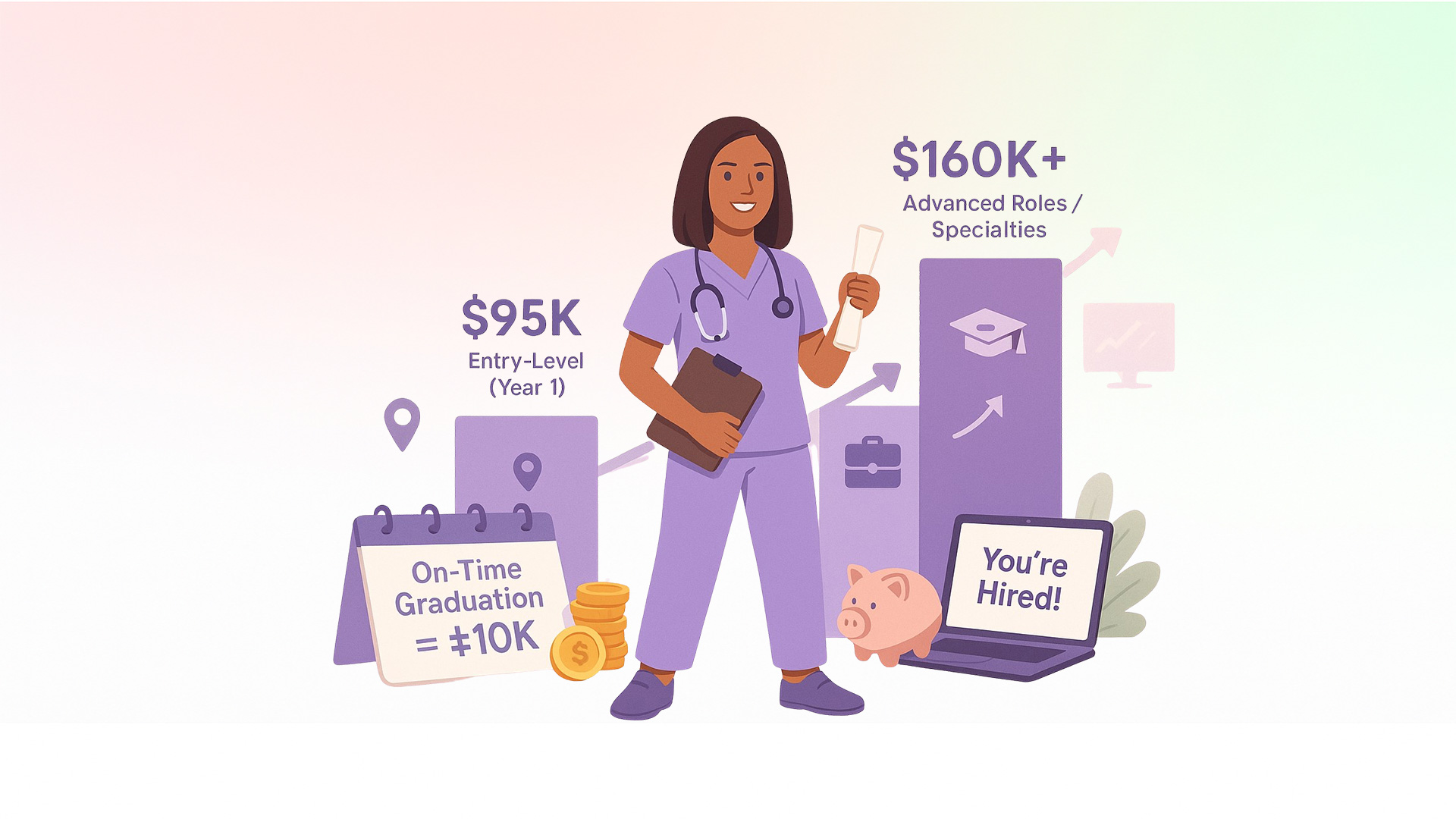TL;DR: Nurse Practitioner Salary in 2025—What New Graduates Need to Know
- 💰 Strong earning potential – Most new nurse practitioners earn $95K–$110K+ right out of nursing education, with specialized roles pushing the average NP salary to $160K+ in year one across various healthcare settings.
- 📍 Geographic factors affect pay – California leads the highest paying states with $173K annual salary, but even southern states offer competitive practitioner salary packages through loan forgiveness and signing bonuses for registered nurses.
- 🧠 Specialization drives higher salary – Psychiatric mental health, critical care, and nurse anesthetists consistently exceed the national average from Bureau of Labor Statistics—some specialties earn over $200K working in surgical hospitals and physicians offices.
- ⏳ Graduation delays impact income – Every semester delay in clinical rotations can cost nurse practitioners $10K+ in missed annual wage potential. Completing your master's degree on time maximizes six-figure earning opportunities.
- 🚀 Strategic planning for employment success – Services like NPHub and NPHire help nursing students graduate on schedule and secure premium job opportunities in primary care, mental health, and other high-demand healthcare industries faster.
After months of rigorous coursework and the exhausting search for clinical rotations, you're probably wondering: "Will all this stress and investment actually pay off?" If you're a registered nurse pursuing your master's degree to become a nurse practitioner, here's the encouraging news you need to hear.
The numbers don't lie. Nurse practitioners consistently rank among the highest-paid nursing professionals, with a median annual salary of $129,210 according to the Bureau of Labor Statistics. Even more promising? Entry-level nurse practitioner salaries typically start well above six figures, with new graduates earning between $95,000 and $160,000+, depending on their specialty and location.
However, many NP students may not realize that every month you delay graduation directly impacts your earning potential. While you're juggling coursework, working full-time, and navigating the complex world of securing preceptors for your clinical placements, each semester delay costs you thousands in lost wages. A single semester delay can mean missing out on $10,000+ in potential earnings – money that could help pay down those student loans faster.
We understand the unique challenges you're facing. Finding quality preceptors while managing your existing responsibilities as a working nurse feels overwhelming. The good news? Your investment in nursing education is about to transform your career in ways that extend far beyond just the paycheck.
In this guide, we'll break down exactly what you can expect to earn as a new graduate nurse practitioner, explore the factors that influence practitioner salary ranges, and show you why completing your clinical rotations on time is crucial for maximizing your earning potential from day one.
Nurse Practitioner Salary Overview: What to Expect
According to the most recent data, nurse practitioners earn a median annual salary of $129,210, positioning them among the highest-paid registered nurses in healthcare. For context, this represents a 38% salary increase compared to staff nurses, who earn a median annual salary of $93,600.
Entry-Level and New Graduate Expectations
If you're wondering about entry-level nurse practitioner salary ranges, here's what the data reveals:
- New graduates typically earn between $90,000 and $110,000 in their first year of practice, depending on their specialty and geographic location.
- Many new graduate nurse practitioner salaries exceed these baseline figures, particularly in high-demand specialties or markets experiencing healthcare provider shortages.
- The 10th percentile of NPs earn around $97,960, while those in the 90th percentile can command salaries exceeding $160,000.
The salary range for nurse practitioners varies significantly based on several key factors. The national average nurse practitioner salary sits comfortably in six-figure territory, with most practicing NPs earning between $106,000 and $144,000 annually.
Understanding Your Earning Trajectory
What makes the NP salary outlook particularly attractive is the consistent year-over-year growth. Over the past decade, nurse practitioner salaries have increased annually. This upward trend reflects several key factors:
- Growing demand for primary and preventive care providers as the aging population requires more healthcare services
- Expanding scope of practice for nurse practitioners across most states, allowing for greater autonomy and higher compensation
- Healthcare provider shortages creating competitive job markets that drive wages upward
Your hourly wage as an NP also presents flexibility that many other healthcare roles don't offer. While many positions are salaried, hourly NP rates typically range from $45 to $75 per hour for standard clinical work, with specialty and urgent care positions commanding even higher rates.
The employment outlook reinforces these positive salary trends. With 40% projected job growth from 2022-2032, more than ten times the average for all occupations, the demand for skilled nurse practitioners continues to outpace supply, naturally driving compensation upward.
Factors That Impact Your Future NP Earnings
Understanding what drives nurse practitioner salary variations can help you make strategic decisions about your career path and maximize your earning potential. While the national average provides a helpful baseline, your actual compensation will depend on several key factors that can significantly impact your income trajectory.
Geographic Location: Where You Practice Matters Most
Location represents one of the most significant factors affecting practitioner salary, often outweighing experience and specialty considerations. The highest paying states for nurse practitioners consistently include:
- California leads with median salaries of $173,190, though the high cost of living must be factored into take-home pay calculations.
- New York, Massachusetts, and Washington also offer competitive wages ranging from $143,000 to over $160,000 annually.
- Southern states typically offer lower base salaries, but many provide substantial incentives like loan repayment programs and lower living costs.
The contrast between regions can be striking. While California NPs earn nearly 30% above the national average, some southern states pay closer to the national median. However, rural areas often compensate for lower base salaries through signing bonuses, loan forgiveness programs, and reduced competition for positions.
Healthcare Setting: Your Work Environment Shapes Your Paycheck
Where nurse practitioners work significantly impacts their annual salary and job opportunities. Different healthcare settings offer varying compensation structures and benefits:
- Psychiatric and specialty hospitals typically offer the highest wages, with median salaries around $144,860 for specialized care environments
- Outpatient care centers and specialty clinics often provide competitive compensation packages, averaging $140,000-$145,000
- Physicians' offices and primary care settings employ the largest number of NPs but typically offer more modest salaries in the $120,000-$135,000 range
- Home health care services provide unique opportunities for autonomous practice, though compensation varies widely by region and patient volume
Hospital-based positions often include additional benefits like shift differentials for nights and weekends, comprehensive health insurance, and retirement matching programs that enhance overall compensation beyond the base salary.
Specialization: High-Demand Areas Command Premium Pay
Your choice of specialty significantly impacts earning potential, with some areas commanding substantially higher salaries due to demand and complexity:
- Nurse anesthetists represent the highest-earning NPs, with median salaries exceeding $200,000 due to the specialized nature of anesthesia care
- Psychiatric mental health nurse practitioners benefit from the growing demand for mental health services, often earning 15-20% above general practice NPs
- Critical care nurse practitioners working in intensive care units and emergency departments typically earn premium wages due to patient acuity and specialized skills
- Nurse midwives focusing on women's health and childbirth services earn competitive salaries, particularly in underserved areas with high demand for maternal care
Primary care nurse practitioners, while representing the largest segment of the profession, typically earn at or slightly below the national average but enjoy greater job security and work-life balance.
Experience Level: Your Career Timeline Affects Compensation
Experience plays a crucial role in salary progression, with clear distinctions between career stages:
- New graduates typically start at $90,000-$110,000, regardless of their master's degree specialty, as they build clinical experience and patient management skills
- Mid-career practitioners with 5-10 years of experience often see salaries increase to $110,000-$130,000 as they develop expertise and take on leadership responsibilities
- Senior-level NPs with over 10 years of experience can command six-figure salaries well above the national average, particularly when they transition into administrative or specialized roles
Many employers offer structured salary increases tied to years of service, performance metrics, and continuing education achievements, providing a clear pathway for income growth.
Education Level: Advanced Degrees and Their Financial Impact
While a master's degree remains the standard entry requirement for nurse practitioners, educational choices can influence long-term earning potential:
- Master of Science in Nursing (MSN) programs provide the foundational education required for NP practice and board certification
- Doctor of Nursing Practice (DNP) degrees may offer slight salary premiums in some markets, though the return on investment varies by employer and specialty
- Specialty certifications and fellowships often provide more immediate salary benefits than additional degrees, particularly in high-demand areas like dermatology or emergency medicine
The key consideration for education investment is understanding your target practice area and researching whether employers in that specialty value advanced degrees enough to justify the additional time and financial investment.
The Path to Maximizing Your NP Salary Potential
Your journey to a six-figure nurse practitioner salary doesn't begin after graduation—it starts with the strategic decisions you make during your nursing education. Understanding how to optimize your path to practice can mean the difference between starting your career on schedule at $95,000+ or facing costly delays that impact both your timeline and earning potential.
The Critical Importance of Completing Clinical Rotations on Time
Every semester delay in completing your clinical placements directly translates to lost income. Consider the math: if the average nurse practitioner salary for new graduates is $100,000 annually, a single semester delay costs you approximately $10,000+ in potential earnings—money that could significantly reduce your student loan burden or provide financial security as you transition into practice.
The challenge many NP students face is the complex process of securing quality preceptors while juggling full-time work, coursework, and personal responsibilities. The shortage of available preceptors, combined with limited school support, creates a bottleneck that can derail even the most dedicated students' graduation timelines.
Streamlining Your Clinical Placement Process
This is where strategic planning becomes crucial. Successful NP students recognize that finding quality preceptors requires the same level of attention as their coursework. Rather than spending months searching independently while managing other responsibilities, many students are turning to specialized services that handle the complex coordination of clinical placements.
NPHub connects NP students with rigorously vetted preceptors, handling all the paperwork and coordination that typically consumes weeks of your valuable time. We've helped thousands of students secure their clinical rotations efficiently, allowing them to focus on their studies and graduate on schedule.
Continuing Education and Specialization: Your Long-Term Salary Strategy
Once you've secured your initial NP position, maximizing your earning potential requires ongoing investment in your professional development:
- Board certifications in high-demand specialties can increase your salary by 15-25% above general practice rates
- Advanced procedural training opens doors to higher-paying positions in specialty clinics and surgical hospitals
- Leadership and management courses prepare you for administrative roles that often command salaries well above clinical positions
- Telehealth certifications position you for the growing remote healthcare market, which often offers competitive hourly wages and flexible scheduling
Accelerate Your Career Growth with Strategic Resources
As you plan your career advancement, having access to comprehensive resources becomes essential. NPHire specializes in connecting nurse practitioners with high-paying positions that align with their career goals and salary expectations. Whether you're seeking your first position or looking to transition to a specialty role, having expert guidance can significantly impact your earning potential.
The healthcare job market moves quickly, and the best opportunities often go to candidates who are prepared and well-connected. By partnering with career advancement specialists who understand the NP market, you can position yourself for roles that offer not just competitive salaries but also the growth potential that leads to long-term financial success.
Don't let clinical placement challenges delay your graduation and cost you thousands in potential earnings. Discover how NPHire can connect you with premium NP opportunities that match your salary goals and career aspirations. Start building your six-figure nursing career today.
Frequently Asked Questions
1. How long does it typically take to reach the higher end of NP salary ranges?
Most nurse practitioners see significant salary increases within 3-5 years of practice. While new graduates start at $90,000-$110,000, mid-career NPs with 5-10 years of experience often earn $110,000-$130,000. Reaching the top salary ranges ($160,000+) typically requires either specialization in high-demand areas like psychiatric mental health or nurse anesthesia, or transition into leadership roles.
2. What's the real impact of delayed graduation on my earning potential?
A single semester delay costs approximately $10,000+ in lost wages, but the impact extends beyond immediate earnings. Delayed graduation also means missing annual salary increases, sign-on bonuses, and loan repayment program deadlines. Over a career, graduation delays can cost tens of thousands in total compensation.
3. Are NP salaries expected to keep growing, or will the market become oversaturated?
The job outlook remains exceptionally strong. With 40% projected job growth from 2022-2032, demand far exceeds supply. The aging population, physician shortages, and expanding scope of practice laws continue to drive salary growth. Market oversaturation is not expected in the foreseeable future.
4. How do I know if the higher cost of living in states like California is worth the salary increase?
While California offers the highest NP salaries at $173,190, the cost of living is significantly higher. Calculate your take-home pay after housing, taxes, and living expenses. Many NPs find that states like Texas, North Carolina, or Colorado offer better salary-to-cost-of-living ratios. Consider total compensation packages, including benefits, loan repayment programs, and quality of life factors when making location decisions.
About the author
- NPHub Staff
At NPHub, we live and breathe clinical placements. Our team is made up of nurse practitioners, clinical coordinators, placement advisors, and former students who’ve been through the process themselves. We work directly with NP students across the country to help them secure high-quality preceptorships and graduate on time with confidence. - Last updated
Jun 26, 2025 - Fact-checked by
NPHub Clinical Placement Experts & Student Support Team - Sources and references
- https://www.nphub.com/rotation-paperwork-process
- https://www.nphire.com/blog/a-guide-for-a-smooth-rn-to-np-transition
- https://www.nphub.com/blog/fnp-salary-guide
- https://collaboratingdocs.com/nurse-practitioner-salary-what-to-expect/
- https://www.intelycare.com/career-advice/nurse-practitioner-salary-facts-figures-salaries-by-state/
- https://nurse.org/education/np-salary-by-state/
- https://www.fhea.com/resource-center/navigating-the-numbers-a-look-at-average-np-salary-and-compensation/
- https://www.bls.gov/ooh/healthcare/nurse-anesthetists-nurse-midwives-and-nurse-practitioners.htm#tab-5
- https://www.nphire.com/blog/highest-paid-nurse-practitioner-specialties-jobs-2025
- https://www.nphub.com/blog/the-hefty-cost-of-delaying-np-graduation
Find a preceptor who cares with NPHub
Book a rotation.webp)








.webp)


.webp)



.webp)